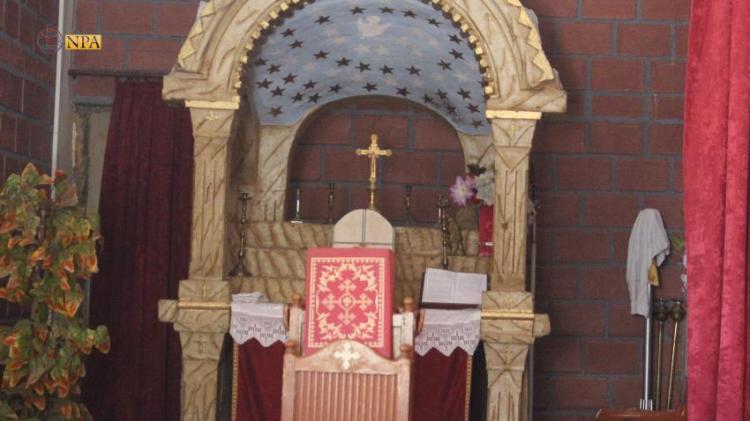Christians properties in Amuda between overlooking and deferred procedures
Reem Chamoun
Like other cities in al-Jazira region, Amuda, northeastern Syria, is known for its diversity of the components that have lived and still live in city, the majority of whom were Kurdish and Syriac, especially during the Christian displacement from Turkey in 1914 and 1915.
About three decades ago, the city also witnessed a mass exodus of the Christian component, where their properties remained with no care, as their most known landmark of (Tal Sharmola), has now turned into a landfill.
Manal Sheikh Muhammad, the co-mayor of Amuda, spoke to North-Press about the measures that the municipality is scheduled to undertake in order to clean the cemetery of Tal Sharmola.
She explained that Amuda Association for Environmental Protection submitted a request to the municipality to fence the area around Tal Sharmola, the request was approved by the executive office of the municipality, to preserve the properties of the Christians.
One of the oldest churches is also present in the city of Amuda, which was rebuilt in 1927, in the early years of the Christian displacement from Turkey and the settlement in the area.
Meanwhile, the official at the Office of Religions Muhammad Sheikh Muhammad, told North-Press that “there are still no procedures followed by the office to preserve these properties, as many special projects for all religions and beliefs will take place in the future”.
The city of Amuda contains five families of the Christian component, while the Kurdish component makes up more than 70% of the population, in addition to about 20% of the Arab component, all of whom with different religious and ethnic dependence live in a state of coexistence and harmony with each other.
Religious diversity
“Amuda was known for its diversity and different religions, which adds a special glamor to the city, where Kurds, Syriacs and Arabs, were distinct in different domains from the rest of the region”, said Saeed Girgis, a Syriac person who still lives in Amuda.
Regarding the reasons of the great emigration of Christians, Girgis explained that poor living conditions and lack of job opportunities were enough to lead them out of the city.
As for the properties of immigrant Christians of shops, houses or even agricultural lands, Girgis asserted that “all are still there, some have been rented, others have been sold, and the rest are visited by their owners almost every year”.
The Kurdish man Fahad Haj Qaso agreed with Girgis, that living conditions were behind Christians emigration, expressing his sadness for his friends who had emigrated, as they were living together regardless of their religion.
While Obaid Mahmoud, a tailor in Amuda, said: “Goodness is there where the Christians are”. He added that “they are civilized people, in terms of thoughts, professions and traditions, and we wish that Christians return to their city”, as they had relationships based on love, understanding and brotherhood.

